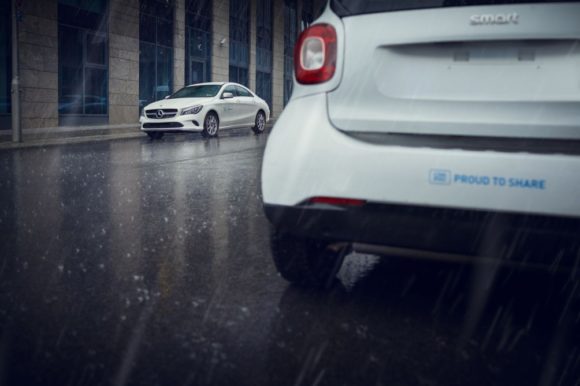WASHINGTON — BMW AG and Daimler AG said Wednesday they plan to exit the North American car-sharing market, with the joint venture partners halting operations in Montreal, New York, Seattle, Washington, D.C., and Vancouver, as they focus on the European market.
SHARE NOW and its Car2Go unit, a joint venture of the two German automakers, are ending operations on Feb. 29 in the United States and Canada, citing the “volatile state of the global mobility landscape,” and the costs of operating in North America.
The company also said it was halting operations in three European cities, Florence, London and Brussels. It said it would focus on “our remaining European cities in which we, along with our shareholders, believe show the greatest potential for profitable growth and mobility innovation.”
DriveNow, part of the combined firm, started in London in December 2014, but “had to face the hard reality that we could still not convince enough people to do so,” the company said in announcing its exit from the UK market.
It is the latest sign of financial struggles in the broader mobility market and a setback to those who view car-sharing as a way to reduce carbon pollution and congestion, because unlike ridesharing services, the vehicles are not on the road between trips.
A 2016 study found that each U.S. Car2Go resulted between seven and 11 fewer privately owned vehicles.
Car2Go had 1 million North American members and 3 million worldwide.
The service allowed consumers to rent vehicles by the minute and park them on city streets or at parking meters without charge. The service faced tough competition from ride-hailing firms such as Uber Technologies Co, Lyft Inc and electric scooters.
In October, the companies ended operations in Denver, Austin, Texas; Portland, Oregon; and Calgary, British Columbia; and announced an end to Chicago operations.
In 2018, Daimler bought Europcar’s remaining 25% stake in Car2Go for 70 million euros ($78 million). Last year, BMW and Daimler merged their car-sharing units Car2Go and DriveNow as well as ride-hailing, parking and charging services.
BMW’s chief executive, Oliver Zipse, said last month that “there are potentially ‘disrupting’ business models that rely on car usage rather than car ownership. But they are focused on very specific areas with high population densities to ensure high utilization rates.”
Photo courtesy of Car2Go.
Was this article valuable?
Here are more articles you may enjoy.


 Uber Jury Awards $8.5 Million Damages in Sexual Assault Case
Uber Jury Awards $8.5 Million Damages in Sexual Assault Case  LA County Told to Pause $4B in Abuse Payouts as DA Probes Fraud Claims
LA County Told to Pause $4B in Abuse Payouts as DA Probes Fraud Claims  Why 2026 Is The Tipping Point for The Evolving Role of AI in Law and Claims
Why 2026 Is The Tipping Point for The Evolving Role of AI in Law and Claims  Tesla Sued Over Crash That Trapped, Killed Massachusetts Driver
Tesla Sued Over Crash That Trapped, Killed Massachusetts Driver 